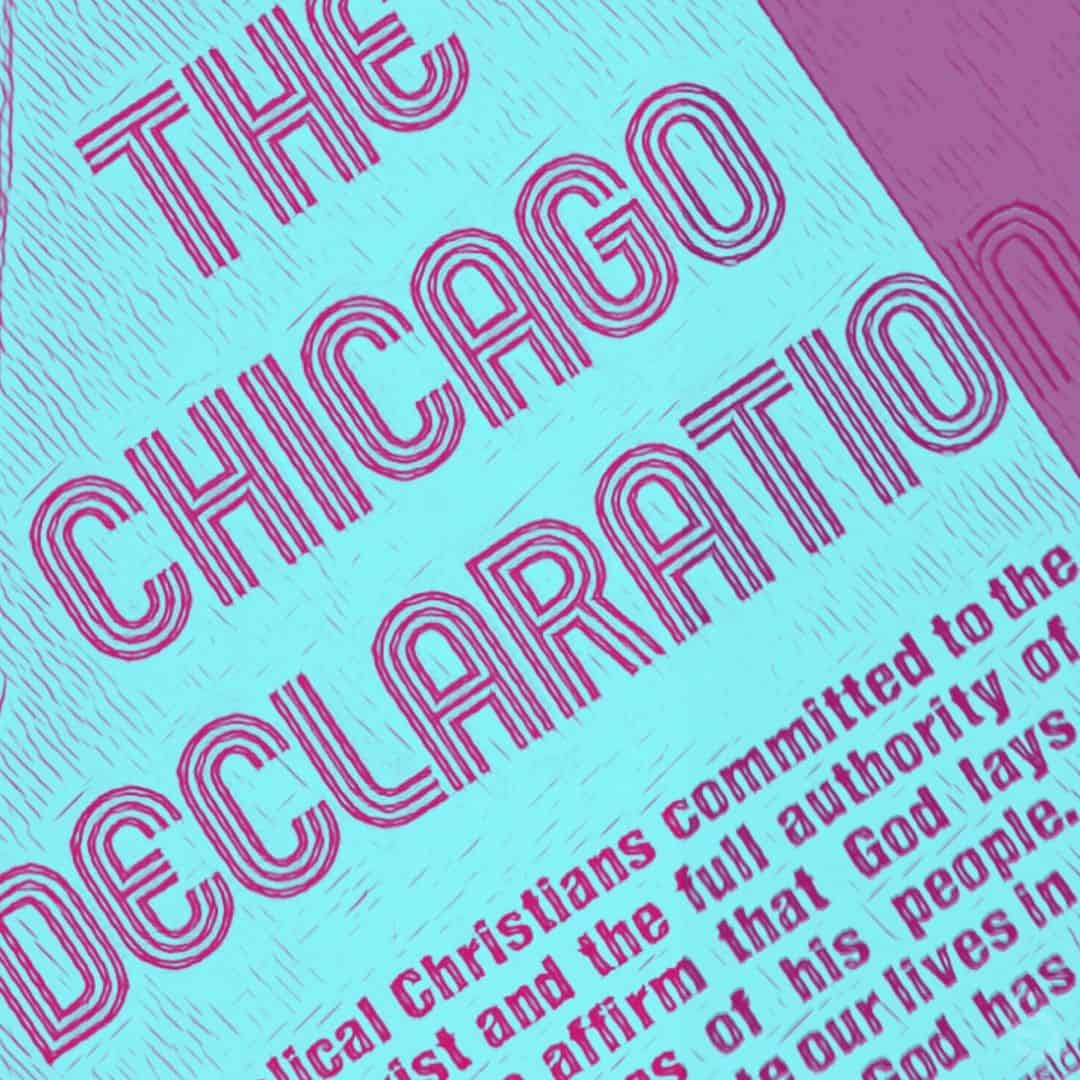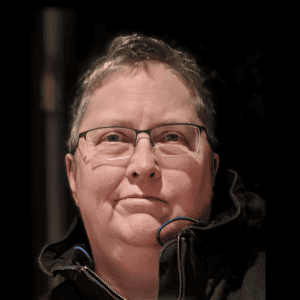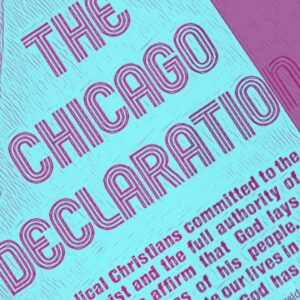 In November 2023, Christians for Social Action celebrated the 50th Anniversary of the “The Chicago Declaration of Evangelical Social Concern,” a document drafted by several evangelical faith leaders and signed by 53 signatories. The final form of the Declaration was created during a workshop attended by dozens of evangelical leaders at the YMCA in downtown Chicago over the Thanksgiving weekend in 1973. Ron Sider (d. 2022), founder of Christians for Social Action, and a few other men organized the gathering. The invited leaders included dozens of men but only a handful of women.
In November 2023, Christians for Social Action celebrated the 50th Anniversary of the “The Chicago Declaration of Evangelical Social Concern,” a document drafted by several evangelical faith leaders and signed by 53 signatories. The final form of the Declaration was created during a workshop attended by dozens of evangelical leaders at the YMCA in downtown Chicago over the Thanksgiving weekend in 1973. Ron Sider (d. 2022), founder of Christians for Social Action, and a few other men organized the gathering. The invited leaders included dozens of men but only a handful of women.
The document was intended to serve as a framework for concrete evangelical engagement with the pressing social issues of the day. Christian Feminism Today (known originally as the Evangelical Women’s Caucus) came into being as a direct result of that Thanksgiving workshop, and with it a movement known as biblical feminism was born.
The first draft of the Chicago Declaration, prepared before the weekend workshop, listed three main social justice concerns. These were the “conspicuous responsibility of the evangelical community” in perpetuating racial injustice, the “materialism of our culture and the maldistribution of the nation’s wealth and services,” and “a national pathology of war and violence.”
Even though the push for women’s equality was well underway in the United States by this time (the Equal Rights Amendment had been sent to the states the year prior, in 1972), the original draft failed to include any mention of that particular pressing social justice concern. Nancy Hardesty (d. 2011), one of the few women who attended, provided a summary of the event:
I received an invitation because I was the former assistant editor of Eternity magazine and had taught English for four years at Trinity College. I had also taken courses at Trinity Evangelical Divinity School. And I was a woman. Only five or six of us were invited: Sharon Gallagher, editor of Radix magazine; Dr. Ruth Lewis Bentley, an African American sociologist who taught at Trinity and at the University of Illinois Medical Center; Betty Danielson, a social worker from Minneapolis; Chicago black activist Wyn Wright Potter; and Eunice Schatz, director of Chicago’s Urban Life Center.
Men invited included a few of the elder statesmen of evangelicalism, representatives from various major constituencies, and a group of younger and/or more socially aware, emerging leaders. The convening committee—all male—had prepared a draft of a statement for the group’s consideration. It included lengthy paragraphs on racism, poverty, economic injustice, and militarism, but no mention of women at all. Eventually I raised my hand and pointed this out. A committee—still all male—was delegated to redraft a more succinct statement. A member of that committee, Gordon-Conwell seminary professor the late Stephen Mott, leaned across the table and whispered, “Give me something to add to the statement and I’ll try to get it in.” On a scrap of paper I wrote: “We acknowledge that we have encouraged men to prideful domination and women to passive irresponsibility. So we call both men and women to mutual submission and active discipleship.”
… I was not present when the new draft was debated. Eunice Schatz carried the cause in that debate—although she later told me that apparently we women all look alike because Carl Henry kept referring to her as “Nancy.”
The statement Hardesty wrote ended up being included in the final Declaration with only one small change (passive irresponsibility changed to irresponsible passivity).
The next year, 1974, the group expanded and met again on Thanksgiving. This time, there were many more women invited, because Nancy Hardesty had wisely volunteered to be the “secretary” of the second meeting planning committee and thus was able to locate and extend invitations to other evangelical women and men interested in gender equality.
Hardesty and her friend Letha Dawson Scanzoni (d. 2024) had recently written a book, All We’re Meant To Be, making the biblical case for women’s equality. The book was published just a few months prior to the second gathering. Evangelical women who had long felt their role in church and society was limited by what the Bible said now began to understand that their role was, instead, limited by what some human beings said about the Bible.
The 1974 Thanksgiving meeting saw the larger group break into smaller “caucuses,” each focused on a particular issue. The people invited by Hardesty came together to discuss women’s issues, and this newly created women’s caucus identified three main issues to recommend to the larger group of meeting participants.
First, the group identified that using exclusively androcentric language for God (God being referred to only as He, Him, Father, etc.) led directly to the misapprehension that God was male and, thus, that male people were fully aligned with the divine image while female people were less aligned. This, the caucus reasoned, led to all sorts of misunderstandings, injustices, and confusion about God’s plan for humanity.
Second, they addressed the fact that Christian institutions paid women much less than their male counterparts (many of the women attending had experienced this), even for the same job. Despite the federal Equal Pay Act having been passed in 1963, women continued to earn around 60 percent of what men earned throughout the ’60s and ’70s. This situation was no different than it was in the culture at large, but the women’s caucus participants correctly identified there should be every effort made to correct this disparity within an institution founded on a faith based on justice and care for others.
Finally, the group expressed their endorsement of the Equal Rights Amendment, which, after receiving ratification in 33 state legislatures, seemed to be stalled out with just five additional states needed in order for the amendment to become a part of the Constitution (sadly, only two more states would go on to ratify the amendment before the deadline passed).
For evangelical women, perhaps the most important thing to emerge from the 1974 Thanksgiving meeting was the coming together of a group of determined academics, clergy, and activists dedicated to ensuring that the spiritual gifts of Christians were no longer dismissed or repressed simply on the basis of gender. The women’s caucus members who met in 1974 went on to hold their own successful conference, Women in Transition, over Thanksgiving weekend in 1975. The conference resulted in the creation of a network of biblical feminists, opening lines of communication and allowing coordination of efforts in Bible-based activism. Within a few years, the Evangelical Women’s Caucus (EWC) was a nonprofit corporation with chapters all over the country and thousands of names on their mailing list.
Over the next 50 years, the Evangelical Women’s Caucus (currently known as Christian Feminism Today) continued to coordinate conferences, retreats, and events focused on issues related to women’s equality in Christianity and the larger society. In 1986, EWC took an official position in favor of gay and lesbian civil rights, recognizing that to be an important aspect of gender justice supported by the Bible. Whereas previously biblical feminism had been tolerated within evangelicalism, supporting LGBTQ+ people was seen as a bridge too far. Those who claimed a Christian feminist identity were deemed heretical, and their speaking, writing, and publication were actively suppressed within evangelicalism.
A significant percentage of Evangelical Women’s Caucus members split from the organization, eventually forming another organization, Christians for Biblical Equality (CBE). CBE aligned itself with the “traditional” view that lesbian and gay people must be denied equality and affirmation within Christian community. Yet they have continued to carry on the work of promoting a biblical basis for gender justice via scholarship, publishing, and conferences over the past forty years.
More recently, however, those claiming to be evangelical—such as the tens of thousands of churches aligned with the Southern Baptist Convention and the even more conservative Independent Fundamentalist Baptists—reject the idea of a biblical basis for gender equality and have, instead, doubled-down on enforcement of the “complementarian” view of women’s place in the home, church, and society.
Still, in the 50 years since the back-to-back Thanksgiving workshops called by Ron Sider and others, the biblical feminist work that was begun has continued, strengthening itself and weaving together with the work undertaken by activists and advocates in many other Christian denominations and traditions. Though female-identified Christians, like members of the culture at large, are still dealing with endemic examples of gender-based violence and lingering inequalities in both pay and opportunity, the majority of Christian people now have access to churches and faith communities that allow them to live outside the restrictive rules and norms once imposed on them by those in power.
For those interested in learning more about the Thanksgiving meetings, the genesis of Christians for Social Action, Christian Feminism Today, and progressive evangelicalism in general, the following books will provide some interesting reading:
- The Other Evangelicals by Isaac Sharp
- Progressive Evangelicals and the Pursuit of Social Justice by Brantley W. Gasaway
- Moral Minority: The Evangelical Left in an Age of Conservatism by David R. Swartz (But also read Mark Olsen’s review, in which Olsen, someone directly involved in this history, points out issues with both Swartz’s historical account and his conclusions.)
 Lē Isaac Weaver identifies as a non-binary writer, musician, web developer, and feminist spiritual seeker. They are an alumnus of Christians for Social Action’s Oriented to Love dialogue program.
Lē Isaac Weaver identifies as a non-binary writer, musician, web developer, and feminist spiritual seeker. They are an alumnus of Christians for Social Action’s Oriented to Love dialogue program.

